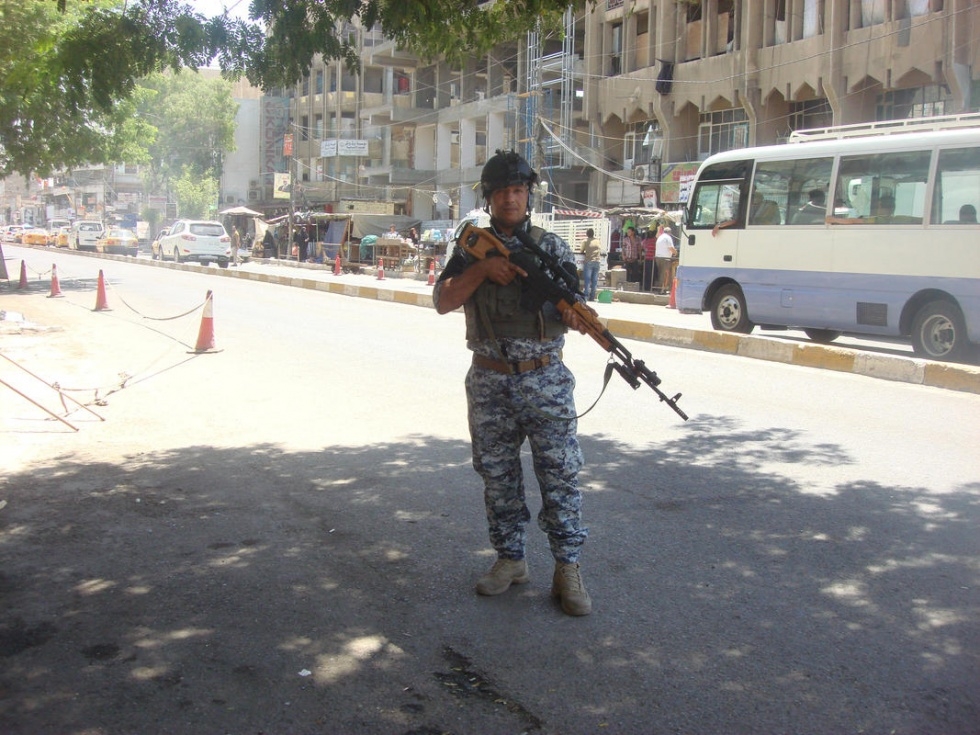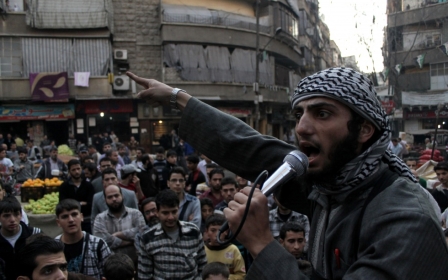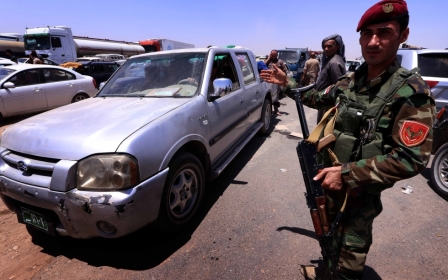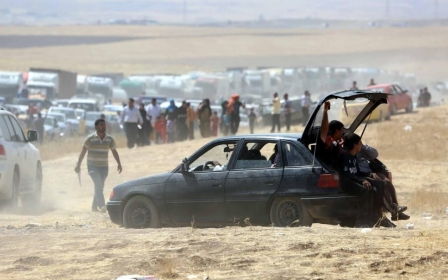Fear and resolve mingle in Baghdad

BAGHDAD - “We just want to live our lives in peace. We don’t want chaos,” was the chant that echoed over the streets of Baghdad today.
People here fear a fast return of danger, reminiscent to the days of the US invasion in Iraq, and for good reason.
Two weeks ago, at least 12 people were killed, after a car bomb exploded in central Baghdad. The explosion happened right across the street from a busy platform of small supermarkets and shops. Abu Omar, an owner of one of those shops that was destroyed the day of the explosion, believes the Iraqi army is not capable of securing the capital.
Albeit security has always been a major concern for Iraqis, the advance of the IS (Islamic State of Iraq and the Levant) rebel fighters has made them all the more anxious.
"The Iraqi army is not strong enough to stop the Sunni extremists of IS. In the past we had the American soldiers to protect us, but they will never come back again,” Abu Omar told Middle East Eye.
Rather easily and without any resistance from the Iraqi army, IS seized Mosul, Iraq’s second largest city, two weeks ago. Iraqi forces there fled the city before a battle even took place.
Not all fear IS
IS are determined to conquer major parts of the country, including the capital.
The streets of Baghdad are flooded with Iraqi soldiers who guard every street corner. But the knowledge that IS is stronger, instils an understandable amount of discomfort in the people of the city.
“They (Iraqi army) backed down when Mosul got attacked. How can they ever be strong enough to protect us?” Abu Omar said. Others share his sentiment.
Haider Alzubaydi, an employee at the Baghdad fire department, believes that the US should do more to protect Iraq’s citizens.
“Recently, the United States sent 300 soldiers to Iraq, but only for the purpose of protecting their own interests. They want to keep the American embassy secure along with neighbourhoods inhabited by Americans, but they don’t care about the fate of Iraqis,” Alzubaydi said.
“Obama urged Maliki not to differentiate between Shiites and Sunnis, that as citizens of Iraq - they are all the same. But nobody listens to Maliki. Each and every fighter listens to his own tribal leader only. The US needs to talk to these tribal leaders, not with Maliki,” Alzubaydi believes.
With confidence in their national army waning as IS is approaching fast, not everybody believes IS will make it to the capital.
Shiite tribes in Baghdad are preparing their militias and have already started patrolling the streets of Baghdad around the clock.
Last week, a parade led by a group of Shiite fighters known as the Mehdi army aimed to show the world their preparedness.
“The only reason IS was able to take over Mosul and other towns was because the majority of their populations are Sunni,” expressed Hasanayan Al-Tamimi. Al-Tamimi is a Shiite living in Baghdad.
“We are united against IS and we will fight them until they are all killed or they are forced to surrender,” he said.
Several hundred Shiites have registered as volunteers to fight alongside the Iraqi army against IS.
On the other hand, Sunni tribes in Baghdad believe that the recent turmoil will escalate into a civil war.
“If IS manages to make it to Baghdad, Shiites will fight everybody. They won’t make any effort to differentiate between the Sunni fighters of IS and regular Sunnis like myself who live amongst other Shiites,” said Ammar Mustaf, a 30 year-old Sunni. Christians in Baghdad fear too the coming of IS as the prime target if and when a violent confrontation between Sunnis and Shiites does occur.
But Priest Abuna Mansour of the Greek Church in Baghdad is not gripped by fear like all the others.
“Of course life is dangerous here, but that’s how it has always been. There is no point in worrying and standing idle. That never helps anyone,” Fr. Mansour said.
He is not making any taking any extra precautions to protect his church. If these people are ready to die for what they believe, no force or army can stop them.”
“The last thing I want is to lock people up in a church. We shouldn’t shield ourselves from the world. We should be proud of who we are and show that to the world,” he said.
Priest Mansour’s church is located in Kardasa, a neighbourhood in the city centre of Baghdad. A few years ago, the streets of Kardasa were predominantly inhabited by Christians, but Maliki’s government changed this drastically by subsidising the cost of real estate in Kardasa for Shiites.
The discriminating policy forced many Christians away to towns in the north of the country. Today, the Christian community belonging to Priest Mansour consists of only tens of churchgoers as opposed to hundreds, and now, they too are considering leaving Baghdad for safety.
Raja Potrus who attends Mansour’s weekly sermons, told Middle East Eye: “We’re risking our lives here in Baghdad. Once one war quiets down, another one is already lurking around the corner.”
“The government oppresses us and IS wants a state for Muslims only. There is no place for us here,” she said.
It is disastrous for Fr. Mansour to see how his community is falling apart. Nevertheless this priest is resolute in keeping the church standing. “The people are tired of living in fear. Everybody flees. But in this way the community will lose its identity. My aim is to protect her. The government destroys everything by dividing fellow countrymen, but I will keep the church together as long as I am alive,” he assures.
Meanwhile, daily life continues. Fathalla, a 72 year-old farmer who maintains gardens of Shiites in Kardasa, “doesn’t want to trouble trouble, until trouble troubles him.” “I survived the threats for all these years. I’m not afraid. When you are afraid, you just don’t do anything anymore, and that is much worse,” he says with a smile.
For Jamal Jamaal, the situation is different. Jamaal is a Sunni from a mixed marriage. He lives together with his wife in a predominantly Shiite neighbourhood and fears that this violence will escalate. “We have seen how things unrolled in the past, everybody was killing everybody,” expresses Jamaal. “On all sides, leaders urge to take up weapons. This can’t lead to anything except more violence.”
In the meantime, Iraqi soldiers stand guard at one of the biggest interchanges of the city. But they seem to have more interest in their televisions - which are tuned into the World Cup - than to the threat that hangs over their heads.
New MEE newsletter: Jerusalem Dispatch
Sign up to get the latest insights and analysis on Israel-Palestine, alongside Turkey Unpacked and other MEE newsletters
Middle East Eye delivers independent and unrivalled coverage and analysis of the Middle East, North Africa and beyond. To learn more about republishing this content and the associated fees, please fill out this form. More about MEE can be found here.




